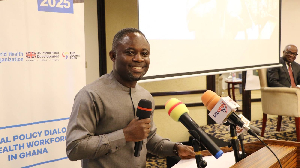 Minister of Health, Kwabena Mintah Akandoh
Minister of Health, Kwabena Mintah Akandoh
The Ministry of Health, in partnership with the World Health Organization (WHO), has convened a two-day National Policy Dialogue aimed at addressing key challenges facing Ghana’s health workforce.
Held under the theme “Transforming Ghana’s Health Workforce for UHC: Align, Invest, and Sustain,” the event brought together stakeholders to deliberate on pressing issues such as workforce distribution, unemployment, skills shortages, and the growing migration of health professionals.
Speaking in Accra on April 9, 2025, Minister of Health, Kwabena Mintah Akandoh emphasized the need for bold and innovative strategies to reposition the sector for long-term sustainability and the achievement of Universal Health Coverage (UHC).
“We must look at these challenges not just as obstacles, but as opportunities to rethink our health workforce strategy—to innovate and to forge partnerships grounded in evidence, equity, and sustainability,” Akandoh said.
The Minister referenced findings from a recent Health Labour Market Analysis (HLMA), which presented a mixed picture of progress and ongoing challenges.
Between 2013 and 2022, public sector health worker density increased from 16.56 to 41.92 per 10,000 people. However, nearly 40% of trained health professionals remain unemployed. Additionally, only 38% of health workers are deployed to rural areas, which are home to over 40% of the population.
“This geographical mismatch is a longstanding issue, and it demands fresh thinking and innovative deployment strategies,” Akandoh added.
One of the most pressing concerns raised was the increasing rate of health worker migration. Between 2020 and 2022, there was a 232% increase in the number of nurses seeking verification to work abroad. Over 5,000 nurses did so in the first half of 2023 alone.
According to the Minister, economic disparities are a major factor.
“On average, our health workers earn GH₵2,813, yet they consider GH₵3,000 to be the minimum acceptable wage. Abroad, the average wage is nearly GH₵10,000—that’s more than three times higher,” he noted.
Despite the challenges, Akandoh pointed out that the public sector remains relatively more attractive in terms of remuneration, citing that medical doctors in the public sector earn nearly 47% more than their counterparts in the private sector.
Chief Director of the Ministry of Health, Alhaji Hafiz Adam, also underscored the need for sustainable solutions.
He noted that with support from development partners, Ghana has significantly expanded its health workforce over the past two decades.
Nonetheless, he emphasized the importance of greater investment in job creation, education, and retention strategies.
The dialogue also featured a high-level panel discussion focused on enhancing coordination, strengthening regulatory frameworks, and securing long-term financing to support Ghana’s healthcare system.
Participants included senior officials from various ministries, private health institutions, professional associations, and international development partners.
AM/KA
Meanwhile, watch GhanaWeb’s tour of Fort Victoria and the Cape Coast Lighthouse below:
